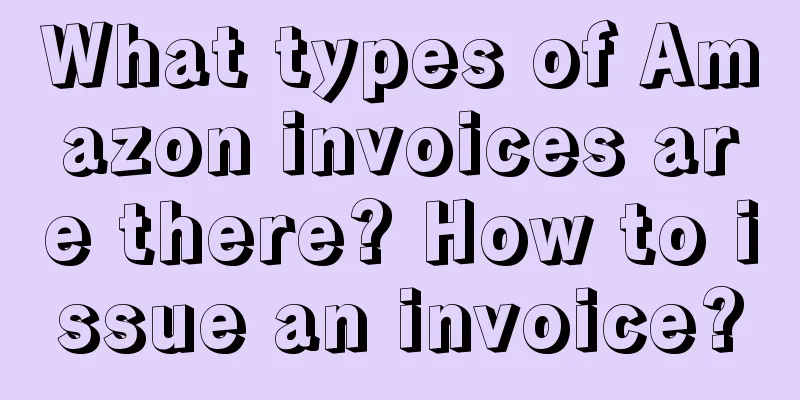How do cross-border e-commerce businesses pay taxes? What taxes do they need to pay?

|
As Chinese citizens, as long as your income reaches the tax standard, you need to pay taxes. This is our obligation and responsibility as Chinese citizens. Tax evasion is illegal. So how do cross-border e-commerce companies pay taxes? 1. How do cross-border e-commerce businesses pay taxes? The tax obligations of individual sellers mainly include value-added tax and personal income tax. As long as they meet the tax standards, they can declare it themselves within the specified time. 2. What taxes should be paid? 1. Tariffs. As an export cross-border e-commerce company that needs to sell to different markets, one tax that cannot be avoided is tariffs, and the tariff policies of each country or region are different. Therefore, when cross-border e-commerce companies go overseas for sales, they should pay close attention to the specific policies and changes of import tariffs in different countries. The EU countries have formulated a common trade policy, which is a common customs tariff and trade policy for third countries implemented by EU member states. That is to say, no matter which country or region is imported into the EU, the import tariff is the same. The US import tariff stipulates that goods from third countries and regions can be levied on the basis of price (percentage of the value of the goods) or on the basis of volume (unit: US dollars/cent). In addition, the Sino-US trade negotiations continue to affect the import and export tariff rates of both sides. 2. Import value-added tax. It is different from general VAT. The value added of production, wholesale, retail, etc. is taxable. Import VAT is a special VAT levied on the value added of import. Amazon sellers make sales after paying import VAT to the authorities. The actual tax paid can be deducted from the import VAT of the goods. 3. Sales turnover tax. This is a type of tax that needs to be paid after the product is sold. It is a turnover tax levied on the added value generated during the circulation of goods. From the principle of tax calculation, value-added tax is a turnover tax levied on the added value of goods production, circulation, labor services or goods. 4. Income tax. Corporate tax is based on the actual operating profit of the enterprise, multiplied by different income tax rates. E-commerce sellers need to pay the corresponding income tax rate in the target country or home country according to the nature of the entity, such as enterprise or individual. If cross-border e-commerce wants to pay taxes, it needs to reach the tax threshold. At the same time, there are many types of taxes that cross-border e-commerce needs to pay. The specific taxes that need to be paid are introduced here, you can take a look. Recommended reading: Which platform should I choose for my personal cross-border e-commerce business? What are the requirements for entry? How much does it cost for personal cross-border e-commerce? Do I need a deposit? Can cross-border e-commerce personal trademarks be registered? What are the regulations? |
<<: What is cross-border e-commerce operation? What are the daily tasks of operation?
>>: How to register on shein? Do I need to pay?
Recommend
What do companies need to provide when receiving foreign exchange? What is the foreign exchange operation process?
As the pace of globalization accelerates, more and...
These graduation season copywritings are so tear-jerking!
It's graduation season again, and countless ar...
Brand is the sum of business operations
Since modern times, the development of business or...
How to “take advantage of crisis and turn crisis into opportunity” in crisis public relations from the BMW MINI incident
The BMW MINI incident was a hot topic. As a market...
To seize the opportunity of Xiaohongshu, you must seize the opportunity of store broadcasting
This article will delve into the rise of store bro...
WeChat Store Distribution, Showdown
A series of recent actions by WeChat Stores, espec...
How much does it cost for a new Amazon seller to ship with free shipping? Can I ship by myself?
As a new Amazon seller, a common question is about...
TikTok Shop has a new policy, allowing you to quickly settle in and sell goods through short videos, live broadcasts, and product displays!
Recently, TikTok Shop has updated its cross-border...
Do I need to pay taxes for Amazon’s overseas direct mail? What are the modes?
If you shop through an overseas purchasing platfor...
Are Shopee and Shopify the same? What is the difference?
Shopee has a strong background and is developing r...
How to quickly increase sales of new products? 4 typical cases of different ways to promote hot products!
After launching a new product, how can a brand inc...
How does Shopee define delayed delivery? Are there any penalties?
As a cross-border e-commerce platform, Shopee has ...
Is it necessary to send Orange Union Payment on eBay? eBay Orange Union Payment Process
As one of the world's largest online auction a...
Sellers who were "driven crazy" by only refunding funds set up a mutual aid association to "save themselves"
Everyone is divided into provincial capitals, citi...
What should I do if I can only report numbers when writing a report?
This article introduces three methods to help data...









